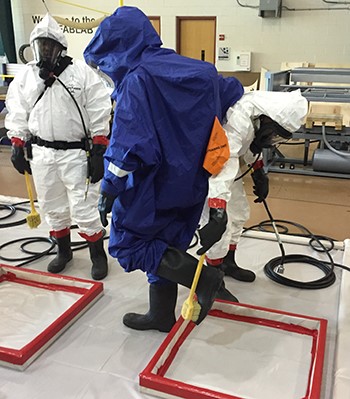CPWR - The Center for Construction Research and Training
CPWR – The Center for Construction Research and Training (CPWR), originally the Center to Protect Workers’ Rights, is the nonprofit construction safety and health research and training arm of the North America’s Building Trades Unions. Led by Chris Cain, CPWR is committed to reducing injuries, illnesses and fatalities in the U.S. construction industry. CPWR’s ECWTP represents a consortium of training providers, community-based partners, building trades councils, and local unions.
Target Populations: CPWR’s ECWTP serves disadvantaged and underserved communities in four urban areas: East Palo Alto, California; Flint, Michigan; New Orleans, Louisiana; and St. Paul, Minnesota.
Training Strategy: The primary training strategy is the apprenticeship and job readiness model, which prepares individuals to access a registered construction trade apprenticeship program where they receive classroom instruction and on-the-job training while getting paid. Additional strategies for training are dependent on location and community needs.
Impact: Since 1999, CPWR's ECWTP has trained more than 3,000 individuals and placed over 76% of program graduates into sustainable jobs.
“Our mission is to provide disadvantaged and underserved communities a comprehensive training program that will prepare them for sustainable careers in environmental and construction industries,” said Steve Surtees, director of the CPWR ECWTP.
CPWR’s ECWTP uses partnerships with academic institutions, community-based organizations, local unions, and employers to leverage resources and provide greater employment possibilities for trainees in its program cities. Many of these partners provide in-kind support to ECWTP trainees, such as health and wellness services, records expungement, and financial literacy training.
The CPWR EWTP consists of many training programs and partners in four diverse settings:
- The East Palo Alto ECWTP is known as Project Build, a pre-apprenticeship model that moves graduates into the local Carpenters Apprenticeship Program. Training is administered locally by JobTrain.
- The Flint ECWTP, known as the Michigan Apprenticeship Readiness Program, places trainees in a variety of construction trades. Training is administered locally by GST Michigan Works in partnership with the Bricklayers and Allied Craftworkers’ Local 2 and the Michigan Building and Construction Trades Council.
- The New Orleans ECWTP, known as the Environmental and Construction Pre-Apprenticeship Program, places trainees into the local Carpenters Apprenticeship Program. Training is administered locally by the Central South Regional Council of Carpenters Training Fund.
- The St. Paul ECWTP places trainees in a variety of construction trades, and training is administered locally by the Minnesota Building Trades Council and the Construction Careers Foundation (CCF).
Engagement with these partners includes drawing on them for local advisory boards, key groups of stakeholders who offer guidance for improving program outcomes. “The most critical aspect of success for the local programs is the composition of their advisory boards,” said Kizetta Vaughn, who for 25 years led the ECWTP.
Advisory boards have been critical for program sustainability and growth. They operate on a volunteer basis and typically include community leaders, employers, community-based organizations, state and local governments, former students, and union representatives. They reflect the populations that the ECWTP serves, as well as the industries the programs look to for job placement. Advisory boards have been instrumental for instructional assistance, technical resources, program guidance, and employment opportunities for ECWTP students and graduates.

(Photo courtesy of Howard Hipes)
Many of CPWR’s target populations reside in disadvantaged areas that are vulnerable to public health emergencies and disasters, such as wildfires, floods, and hurricanes. These events can leave devastating impacts on communities and require workers who have proper health and safety training for response, clean-up and recovery.
One example of how CPWR’s ECWTP helped communities respond is the 2014 Flint water crisis, where unwise decisions about the city’s water system created a public health crisis, particularly by elevating lead levels in the drinking water. CPWR quickly stepped in to help respond, establishing a training program to help meet the need for a skilled cadre of workers who could replace outdated and unsafe water pipes. By the second year of the training program, 20 participants had been placed into a formal apprenticeship in one of the trades participating in the rebuild of Flint and its water system.
This effort marked the beginning of CPWR’s partnership with GST Michigan Works and the Michigan Building and Construction Trades Council, which set out to deliver hazardous waste, lead awareness, confined space, and Occupational Safety and Health Administration outreach training to under- and unemployed residents in the Flint area. The mission in Flint remains the same today, funded in part by State Workforce Investment Act funds, with goals to train unemployed locals so they can improve their livelihood and community.
Opioids are a huge concern for workers in the construction industry, which has one of the highest injury rates of all industries. Many construction workers have been prescribed opioids for treatment, which has led to problems with addiction and even overdoses, some of which have been fatal. “Several state-wide studies have shown that construction workers are six to seven times more likely to die of an opioid overdose than their counterparts in other industries,” said Surtees.
CPWR has created toolkits and resources to inform construction workers about opioid use and addiction. Recognizing the need for opioid awareness training in disadvantaged populations, CPWR recently ran its first pilot training on opioids awareness with ECWTP students in New Orleans and plans on incorporating this important training across all programs going forward.
First source hiring agreements with local businesses have become key successes for the East Palo Alto ECWTP.
In the East Palo Alto ECWTP, local training provider JobTrain has benefited from a project labor agreement with the San Francisco Public Utilities Commission (SFPUC), which provides water and/or power to communities in the Bay Area. This agreement enables trainee referrals to employment opportunities at SFPUC job sites. Additionally, a first source hiring agreement with Facebook enables contractors to hire ECWTP graduates for new construction on its campus, which continues to expand. This partnership is a mutual benefit for trainees, who are given well-paid jobs, and Facebook, which gains skilled employees.

(Photo courtesy of Steve Surtees, CPWR)
T. Sturdivant, St. Paul ECWTP Graduate
In 2007, T. Sturdivant was 31, unemployed, and had a family including two small children to support. He had no vocational experience and found it challenging to obtain consistent, meaningful work.
One day, Sturdivant came across a flyer for a construction training program at a local workforce center. Intrigued, he enrolled in the 12-week program. Sturdivant recalled that the program was intimidating at first, but he believes it helped him prepare for the safety aspects of construction and what to expect on an actual job site.
Upon completion of the program, Sturdivant entered the apprenticeship program with the Operative Plasterers and Cement Masons International Association (OPCMIA) Local Union 633, where he later became a journeyman. Today, he serves as a business agent for OPCMIA Local Union 633 with duties such as organizing and serving as a liaison between members and contractors. He now serves on a variety of state, industry, and contractor association committees and gives back to the next generation of trainees by sharing his story with each pre-apprentice cohort at Local 633.
Sturdivant said he does not know where he would be right now if not for the ECWTP. He said it was life-changing, providing him with an opportunity to pursue a sustainable and meaningful career in the construction industry. His pride in the program was clear as he named the various projects he was involved in building in and around the Twin Cities. “I’m grateful for the career this program gave me but the safety training is what keeps you in the career,” he said.
to Top


